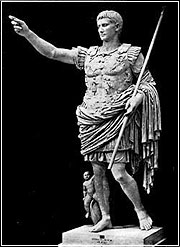August—History of the Month's Origin

A history of the month's name
by Borgna Brunner
 Related Links |
'July' is for Julius
The Roman Senate named the month of July after Julius Caesar to honor him for reforming their calendar, which had degenerated into a chaotic embarrassment. Bad calculations caused the months to drift wildly across the seasons—January, for example, had begun to fall in the autumn.
The high priest in charge of the calendar, the pontifex maximus, had become so corrupt that he sometimes lengthened the year to keep certain officials in office or abbreviated it to shorten an enemy's tenure.
Effective January 1, 45 B.C.
The new calendar went into effect on the first day of January 709 A.U.C. (ab urbe condita—"from the founding of the city [Rome]")—January 1, 45 B.C.—and put an end to the arbitrary and inaccurate nature of the early Roman system. The Julian calendar became the predominant calendar throughout Europe for the next 1600 years until Pope Gregory made further reforms in 1582.
Certain countries and institutions in fact adhered to this ancient system until well into the twentieth century: the Julian calendar was used in Russia until 1917 and in China until 1949, and to this day the Eastern Orthodox church adheres to Caesar's calendar.
The month Julius replaced Quintilis (quintus = five)—the fifth month in the early Roman calendar, which began with March before the Julian calendar instituted January as the start of the year. Unfortunately, Caesar himself was only able to enjoy one July during his life—the very first July, in 45 B.C. The following year he was murdered on the Ides of March.
Augustus for 'August'
After Julius's grandnephew Augustus defeated Marc Antony and Cleopatra, and became emperor of Rome, the Roman Senate decided that he too should have a month named after him. The month Sextillus (sex = six) was chosen for Augustus, and the senate justified its actions in the following resolution:
Whereas the Emperor Augustus Caesar, in the month of Sextillis . . . thrice entered the city in triumph . . . and in the same month Egypt was brought under the authority of the Roman people, and in the same month an end was put to the civil wars; and whereas for these reasons the said month is, and has been, most fortunate to this empire, it is hereby decreed by the senate that the said month shall be called Augustus.
Not only did the Senate name a month after Augustus, but it decided that since Julius's month, July, had 31 days, Augustus's month should equal it: under the Julian calendar, the months alternated evenly between 30 and 31 days (with the exception of February), which made August 30 days long. So, instead of August having a mere 30 days, it was lengthened to 31, preventing anyone from claiming that Emperor Augustus was saddled with an inferior month.
To accommodate this change two other calendrical adjustments were necessary:
- The extra day needed to inflate the importance of August was taken from February, which originally had 29 days (30 in a leap year), and was now reduced to 28 days (29 in a leap year).
- Since the months evenly alternated between 30 and 31 days, adding the extra day to August meant that July, August, and September would all have 31 days. So to avoid three long months in a row, the lengths of the last four months were switched around, giving us 30 days in September, April, June, and November.
Among Roman rulers, only Julius and Augustus permanently had months named after them—though this wasn't for lack of trying on the part of later emperors. For a time, May was changed to Claudius and the infamous Nero instituted Neronius for April. But these changes were ephemeral, and only Julius and Augustus have had two-millenia-worth of staying power.
For further reading:
Calendar: Humanity's Epic Struggle to Determine a True and Accurate Year, David Ewing Duncan (New York: Avon, 1998).







